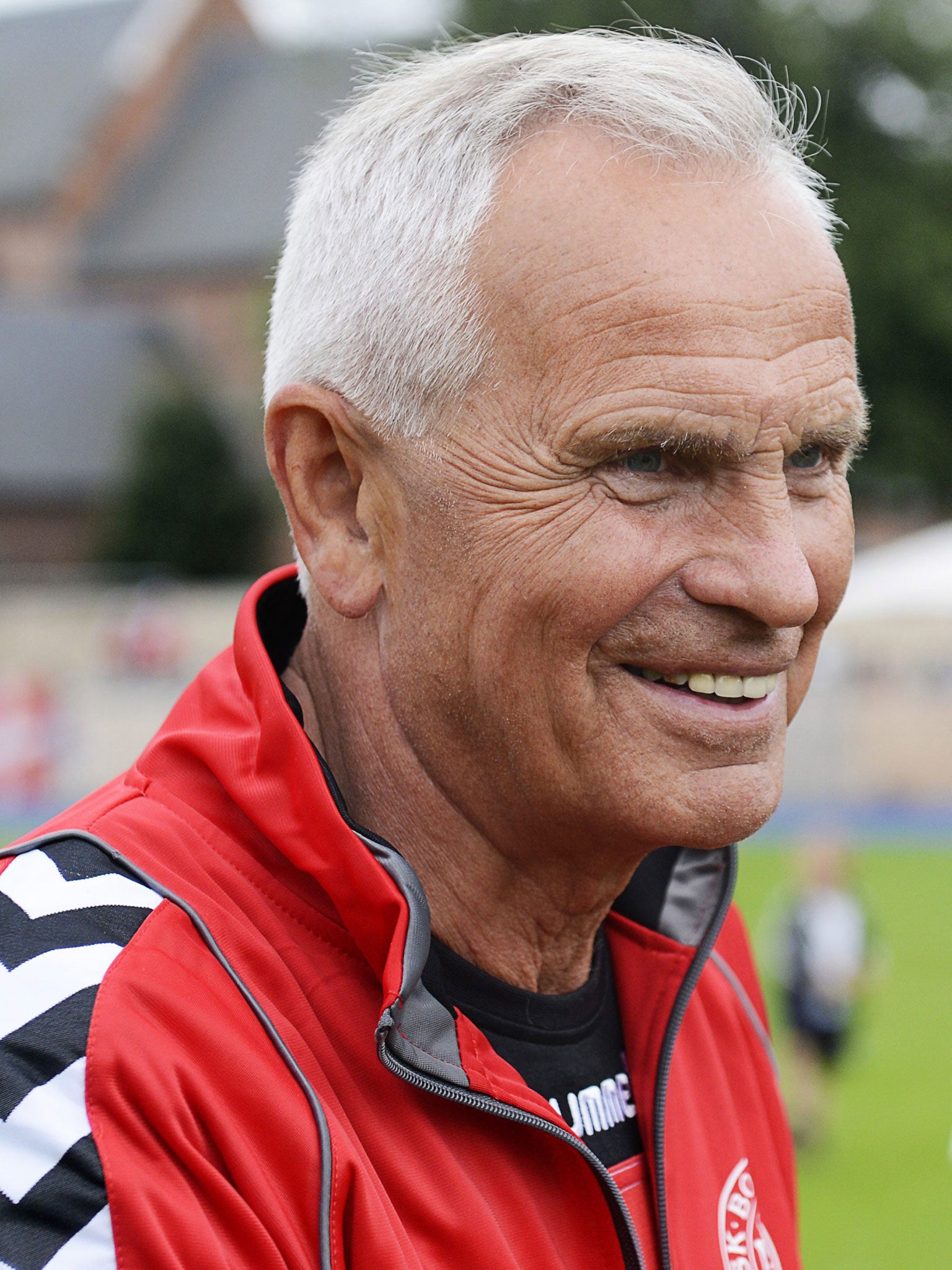Your support helps us to tell the story
From reproductive rights to climate change to Big Tech, The Independent is on the ground when the story is developing. Whether it's investigating the financials of Elon Musk's pro-Trump PAC or producing our latest documentary, 'The A Word', which shines a light on the American women fighting for reproductive rights, we know how important it is to parse out the facts from the messaging.
At such a critical moment in US history, we need reporters on the ground. Your donation allows us to keep sending journalists to speak to both sides of the story.
The Independent is trusted by Americans across the entire political spectrum. And unlike many other quality news outlets, we choose not to lock Americans out of our reporting and analysis with paywalls. We believe quality journalism should be available to everyone, paid for by those who can afford it.
Your support makes all the difference.The posthumous induction of Richard Moller Nielsen into Danish football’s Hall of Fame took place at a venue whose name, the Hans Christian Andersen Hotel in his home city of Odense, could scarcely have been more apposite, given the fairy-tale triumph to which he led Denmark in the European Championship finals of 1992.
Nielsen, who died after suffering from a brain tumour, had been a useful defender before injury forced him to turn to coaching in 1962. He excelled sufficiently for Odense Boldklub to gain two caps for Denmark’s all-amateur side; but it was as a coach and manager in five decades, both for his own country and for Finland and Israel, that he will be remembered – with particular reverence whenever Euro 92 is discussed.
Denmark’s success was all the more incredible for three facts. First, it was assumed within world football that their best chance on the international stage, with the team branded “Danish Dynamite” which included talents such as Michael Laudrup, Jan Molby, Preben Elkjaer and Jesper Olsen, had come and gone on Sepp Piontek’s watch in the 1986 World Cup.
Secondly, Nielsen’s tenure – which began awkwardly after an attempt by the Danish FA (DBU) hierarchy to appoint Piontek’s fellow German Horst Wohlers in 1990 rather than promote Nielsen from assistant manager – was badly undermined when Michael and Brian Laudrup opted out. The lavishly gifted brothers, then playing for Barcelona and Bayern Munich respectively, claimed his emphasis on defensive organisation precluded scope for their creative flair.
Finally, Denmark had not even qualified for Euro 92, which was to be held in Sweden. After a sluggish start under Nielsen, with only a victory over the Faroe Islands, a draw with Northern Ireland and a home defeat by Yugoslavia to show for three group fixtures in the autumn of 1990, even a fine win in Belgrade in the final qualifier left them adrift of Yugoslavia.
Ten days before the finals, however, the governing body of European football, Uefa, banned Yugoslavia from competing because of the civil war raging in the region. Denmark, as group runners-up, were invited to replace them. The myth, shrewdly cooked up by Nielsen, is that the squad were dispersed on beaches, feet up and swigging beer, when the call came. They were actually preparing for a friendly against the CIS (essentially Russia and Ukraine).
Nielsen had, by then, reached a rapprochement with Brian Laudrup. Michael, the superior player, remained absent, as did Molby after what the then Liverpool midfielder later termed “a minor disagreement” with a manager he deemed “defensively minded”. A seemingly unremarkable squad set out against a backdrop of media criticism of Nielsen.
Low expectations appeared justified when the opening two games produced one point (against Graham Taylor’s abject England team) and no goals. Yet they then beat Michel Platini’s France 2-1, a last-minute goal by Lars Elstrup of Luton Town propelling them into the semi-finals. There they drew 2-2 with the Netherlands, the reigning champions, before prevailing on penalties when Manchester United’s Peter Schmeichel saved the final kick by Marco Van Basten.
According to Rinus Michels, the fabled Netherlands coach, what Nielsen’s unsung and supposedly unprepared team had shown Rijkaard, Gullit, Koeman et al was that “football is also about fighting”. Surely, though, Berti Vogts’ Germany would be neither out-fought nor out-thought in the final? In the event, Denmark struck early through John Jensen, later of Arsenal, then clung on thanks to Schmeichel’s agility before sealing victory with a late goal by Kim Vilfort, whom Nielsen had repeatedly allowed to leave the camp to visit his sick daughter.
Denmark also won the Confederations Cup final against Argentina in 1995, yet failed to qualify for the 1994 World Cup and were eliminated at the group stage of Euro 96. Nielsen left to manage Finland, who had never reached a major finals, and they were seconds away from securing a play-off for the right to compete in the 1998 World Cup when Hungary scored to deny them. From 2000 until 2002 he was national coach of Israel, but qualification again proved elusive; in 2003 he returned briefly to the Danish league – in which he’d won championships with Odense –to manage Kolding.
After Nielsen’s death, following a long illness and major surgery, his predecessor, Piontek, hailed “one of the best coaches we’ve had, if not the very best,” also recalling a friend who could “sing, tell funny stories and keep the entire team bus entertained.” Schmeichel, who led the Hall of Fame ceremony and presented a statuette to Nielsen’s son Tommy (himself a coach with Rangers and Aberdeen), tweeted simply: “An inspiration, my teacher. RIP my friend.”
Richard Moller Nielsen, footballer, coach and manager: born Odense, Denmark 13 August 1937; married Jonna (one daughter, two sons); died Odense 13 February 2014.

Join our commenting forum
Join thought-provoking conversations, follow other Independent readers and see their replies
Comments